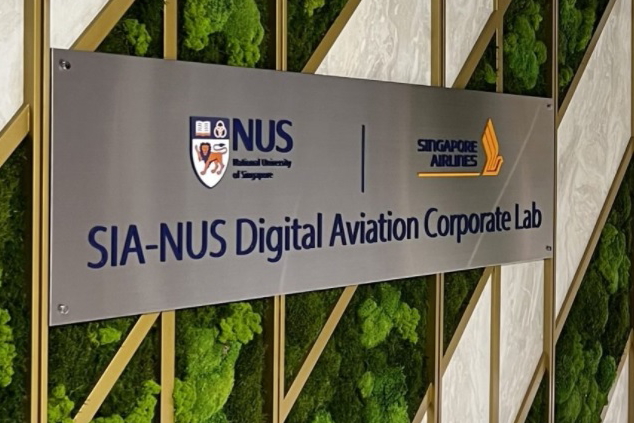|
(11 Jan 2022)
Singapore Airlines (SIA) and the National
University of Singapore (NUS) have established a digital
aviation corporate laboratory.
Situated at
the Innovation 4.0 Building at NUS Kent Ridge campus, the S$45
million research facility is jointly set up by SIA and NUS and
supported by the National Research Foundation Singapore (NRF). It
is the seventh corporate laboratory to
be established at the University, which is also the 19th in
Singapore.
The laboratory will create innovative
technologies and solutions that will accelerate the digital
transformation of Singapore�s aviation sector, and help redefine
the air travel experience for passengers.

Singapore Airlines and the National University of Singapore have established a digital aviation corporate laboratory
Professor Tan Eng Chye, NUS President, said, �This
significant collaboration will tap into NUS� deep-tech and
multi-disciplinary research expertise across artificial
intelligence (AI), machine learning, data science, operations
research and analytics, optimisation, sleep studies and industrial
design, to deliver high value and productivity improvements for
SIA, our country�s flagship carrier. The innovative technologies
developed from the research will redefine the air travel
experience for passengers worldwide, while accelerating the
digital transformation of Singapore�s aviation sector.�
Advancing the digital transformation of
Singapore�s aviation sector
The SIA-NUS Digital Aviation Corporate Laboratory
is helmed by Professor Teo Chung Piaw, Executive Director of the
Institute of Operations Research and Analytics of NUS, and Mr Chan
Mun Chung, Senior Manager at SIA�s Digital Innovation Lab, who
will be the co-Directors of the Corporate Laboratory.
The
objectives of the Corporate Laboratory are to drive
traveller-centric digital services, ensure security and safety in
air travel, and enhance organisational effectiveness and workplace
productivity for SIA and Singapore�s aviation sector.
Goh
Choon Phong, Singapore Airlines Chief Executive Officer, said, �By bringing together NUS� wealth of research
expertise and SIA�s knowledge and experience in the aviation
sector, this Corporate Laboratory will strengthen our position at
the forefront of digital innovation in the airline industry. It
will lead to even more innovative solutions that can enhance the
customer experience and travel journey, optimise revenue
generation, and increase operational efficiency. Our collaboration
with NUS will also reinforce Singapore�s position as a global
aviation hub, with world-class research and cutting-edge
technologies at the heart of our future development.�
Featuring state-of-the-art equipment and
facilities, such as a cabin simulator and a cockpit simulator with
Augmented Reality (AR) and Virtual Reality (VR) technologies, the
Corporate Laboratory will leverage NUS� wide and deep research
expertise across its faculties and research institutes to embark
on research activities in the following areas:
� Revenue Management and Dynamic Pricing: The aim is to develop a new approach to
design optimal price tiers for air tickets and manage seat
inventory, leveraging modern analytical tools and technologies
that can perform deep data analytics in airline revenue management
system. Currently, SIA faces challenges in the areas of price
elasticity estimation, dynamic pricing, and competition. These
challenges require the development of a customised solution for
SIA. Expertise, infrastructure, and relevant background work done
at NUS� Institute of Operations Research and Analytics (IORA),
Business School, School of Computing, and Department of Industrial
Systems Engineering and Management will be tapped on to add value
to the proposed projects in this area.
� Transforming Competency and Skill Development: The Corporate Laboratory
will look at deploying technology to enhance training within the
aviation industry. Specifically, the projects will use eye
tracking technology to quantify and personalise training
programmes for pilots, and tap on Augmented Reality (AR) and
Virtual Reality (VR) technology to complement existing training
programmes, providing SIA with greater learning flexibility. In
the first project, eye tracking technology will be used to develop
a data-driven and competency-based training framework, which will
provide an objective approach to training, as well as potentially
reduce the number of required hours in flight simulators and
training cost. In the second project, the use of AR and VR will
help to complement existing training programmes for new cadets as
well as the routine refresher courses for current flight and cabin
crew by providing greater flexibility in where they can train. It
will also include more types of scenarios and situations that can
be simulated.
� Employee Wellness: The aim is to
develop a fatigue modelling and prediction algorithm that can be
customised for every pilot and cabin crew based on different
fatigue factors. This will allow SIA to enhance pilot and cabin
crew safety and well-being while upholding levels of performance.
In addition, this project aims to achieve a more comprehensive
picture of the well-being of SIA�s flight crew, and provide
guidelines on fatigue mitigation strategies to improve employee
wellness. The outcomes that the Corporate Laboratory aims to
achieve include accurate individual-based fatigue modelling and
prediction, fatigue management approaches and cumulative fatigue
modelling. Expertise and relevant background from NUS� School of
Computing and the Duke-NUS Medical School will be tapped on to add
value to the proposed projects in this area.
� Passenger Comfort, Sleep and Cabin Service: The aim is to create new
products, services, and processes that will improve passengers�
comfort, sleep, and wellness on board SIA flights. This will be
achieved by combining insights from different research approaches,
including data analytics, behavioural and sleep science, design
processes, as well as the organisational knowledge and practices
of SIA. The Corporate Laboratory will focus on developing
innovations in the following key strategic areas related to the
in-flight experience:
- Enhancements to SIA�s Cabin Seat
Product Offerings: The team will develop and implement novel
sensor-based methods for collecting and mining data that can be
used for the purpose of analysing comfort on long-haul flights.
The data mining seeks to uncover critical insights on seat comfort, which will then be translated into specifications and
measurement targets to enhance SIA�s cabin seat products.
- Novel Features to Improve Customers� Sleep on Board Flights:
Evidence-based insights on in-flight sleep quality will be used to
design a sleeping environment that can be adapted to optimise
passengers� sleep. This includes enhancing seat comfort in ways
that facilitate the initiation and maintenance of sleep, optimising environmental factors that affect sleep (e.g. light,
sound, and touch), and the scheduling of cabin services in a
manner that minimises the disruption of passengers� sleep
opportunities.
- Pushing SIA�s Superior Customer
Experience to New Heights: To elevate SIA�s superior customer
experience and renowned in-flight service to the next level, the
team aspires to develop an in-house solution to deploy a
sensor-based, data-driven technology platform. The concept involves capturing, interpreting, and anticipating real-time
passenger needs, as well as designing suitable service
interventions to address passenger comfort both at an individual
and cabin level. The solution processes real-time physiological
variables (e.g., cold/hot, hunger or thirst, sleepiness, fatigue)
to determine passengers� physiological state so as to inform or,
where suitable, prescribe actions for the cabin crew.
Professor Low Teck
Seng, NRF Chief Executive Officer, said, �The partnership between SIA and NUS supports
Singapore�s ongoing digital transformation as it adopts a
data-driven research approach to develop rich insights and
deployable technologies. With the strong industry experience from
SIA and the multi-disciplinary capabilities from NUS, the
Corporate Laboratory is primed to develop innovative and exciting
solutions for the aviation sector, and take them to greater
heights of excellence.�
Over the next five years, the SIA-NUS Digital
Aviation Corporate Laboratory expects to train more than 70
researchers and PhD students, who will play a critical role in
fostering a resilient and long-term research and development, and
engineering talent pipeline for Singapore�s aviation industry.
|
Headlines: |
|
|
